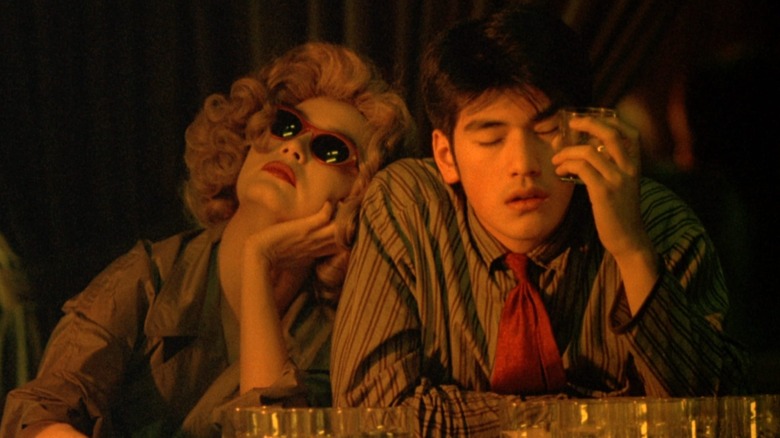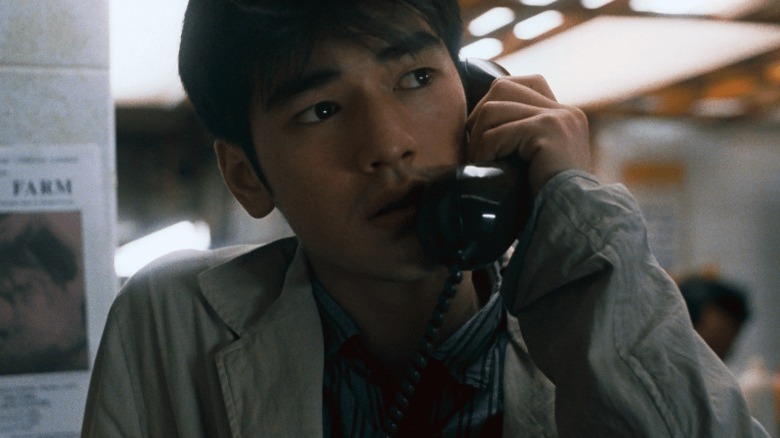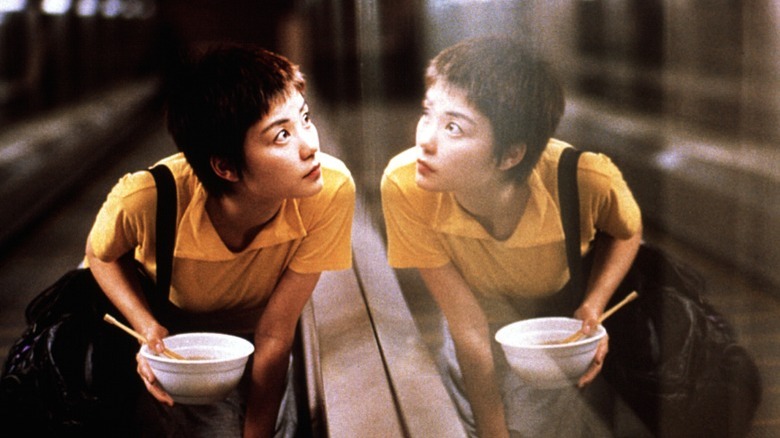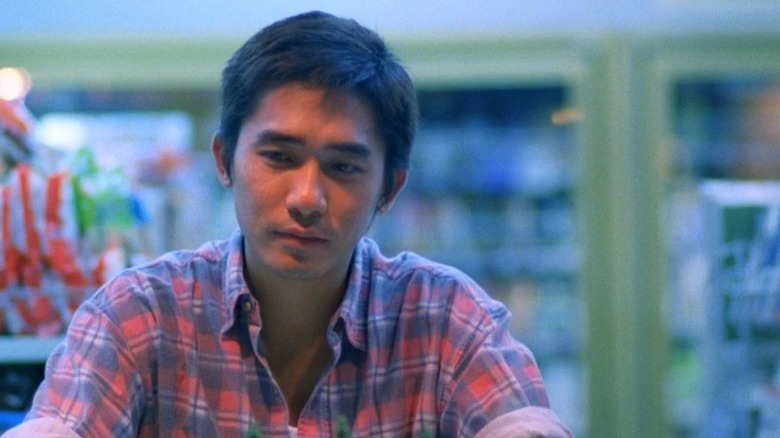Chungking Express Ending Explained: Password Is Love You For 10,000 Years
"At the high point of our intimacy, we were just 0.01 cm from each other. I knew nothing about her. Six hours later, she fell in love with another man."
These lines spoken by Cop 223/He Qiwu (Takeshi Kaneshiro) mark the end of the first vignette in Wong Kar-Wai's intensely lovelorn, melancholic "Chungking Express." Two people who will never interact ever again bump into one another, but this seemingly-serendipitous encounter means nothing in the bigger scheme of things. There's a sense of longing in He Qiwu's words, who is still nursing the cruel sting of heartbreak after the woman he loves unceremoniously dumps him over a phone call. Wong explores these turbulent emotions via vivid, dreamlike sequences in "Chungking Express," a film about the agonies and ecstasies of love in an urban landscape.
The impromptu vibe that permeates "Chungking Express" can be attributed to the fact that Wong made the film in three months. Wong's wuxia period drama "Ashes of Time" had wrapped up post-production in 1994, and the director wanted to make a breezy, contemporary film as a treat in the following months. Following his instincts, Wong weaved the twin storylines of "Chungking Express," which emphasized the innate need to form connections and the inability to hold on to them. Expressions of love in Wong's films are often implicit and emphatically hopeless, thwarted by a postmodern sense of loneliness and alienation. Chance encounters haunt Wong's characters, who go to great lengths to hold on to fleeting tenderness amid an ever-changing, fast-paced world.
How do the love stories in "Chungking Express" end? Just like in life, they close out with whispered promises and the unexpressed hope of seeing the one you love once again. There is a possibility of a future together, and this tender hope is enough nourishment for our protagonists.
Expired pineapples and haunted lovers
He Qiwu, who has been recently broken up with, desperately holds on to the hope that this separation is a joke, as it occurs in the month of April. Believing that his ex will get back with him by May 1, he commemorates this desire by buying canned pineapples that expire on that date. As he inches towards this deadline and finds it difficult to find pineapple cans with this specific date of expiration, He Qiwu spirals out of control due to his inability to hold on to the person he loves. While she has moved on, declaring the death of their relationship, He Qiwu is haunted by a hope that leads him to believe that he can preserve this bond forever.
"The password is: Love you for 10,000 years," he says, adamant to hold on to the notion that love perseveres beyond death and stands the test of time. As He Qiwu wanders the neon-drenched streets of Hong-kong, the absence of his lover looms heavy — for He Qiwu, she is present everywhere he goes. Craving connection and physical proximity, Qiwu stumbles into the ethereal, dreamlike Bottoms Up Club, where he is immediately fascinated by a nameless woman in a blonde wig (Brigitte Lin).
The latter is a recurring trope in Wong Kar-wai's films, often meant to symbolize the extremes of emotional maturity — while the woman in a blonde wig is painfully childlike in his uber-stylistic "Fallen Angels," here, she's a dangerous part of the criminal underworld, mature and well-versed in the extremities of a harsh world. He Qiwu's boyish simplicity and lovelorn nature are at loggerheads with her guarded, effortless charm, and their supposed meet-cute feels like the collision of disparate, alien worlds.
When these lonely characters share a room, nothing happens. However, there's something comforting about being alone together.
Longing, obsession, and daydreams
Part two of the story centers around Cop 663 (Tony Leung), who has recently broken up with his flight attendant girlfriend (Valerie Chow). Grieving in understated ways, Cop 663 still hopes that his ex will turn up in his apartment that they had once shared, and stops to eat at the same snack store at the corner of a busy street. Faye (Faye Wong), who works at the store, gradually falls for the heartbroken cop. After his ex drops off his apartment keys at the shop, Faye breaks into the space every other day to clean, redecorate, and garner an essential understanding of the kind of person she is in love with.
Faye's unrequited obsession unravels over time, deepening her emotional investment in a person who is not even aware of her feelings toward him. Her love for him, although invisible to him, is ever-present when he comes back to his apartment, tired and heartbroken. Over time, Leung's 663 stops attaching meaning to inanimate objects to cope with the loss of his ex, such as when he had urged his wet towel to "stop crying" when his emotional wounds were raw. The nature of these scenes, and the way in which this relationship develops, can easily venture into problematic, creepy territory when analyzed in a certain sense. However, Wong infuses his Faye with a cherubic vulnerability and free-spiritedness, which makes her obsessive, borderline-unethical acts seem like pure, passionate declarations of love.
When in proximity to 663, Faye plays it cool, but her eyes linger on him a tad too long, while everything around her seems hazy, even momentarily unimportant. 663, unaware that he's the object of Faye's desire, exists in a cocoon of loneliness, guarded at all times. But, whatever will happen when he does notice?
Sometimes, loves remains elusive and incomplete
After 663 sheds off his grief-induced obliviousness (he doesn't even notice that his entire apartment has been cleaned without him lifting a finger for most of the second act), he invites Faye to a dinner date. However, Faye decides to become a flight attendant and travels to California, leaving 663 with the hope of her return. Instead of giving into despair again, he is comforted by the fleeting, unspoken love she had for him, and decides to buy out the snack joint and remodel it into a restaurant.
Even after Faye returns, there is no obvious resolution where the two get together. They don't need to, as the tenderness shared between them remains, and their absence from each other's lives has only allowed them to grow and become happier, more evolved versions of themselves. There's freedom in experiencing love for another human being without latent expectations or the need for reciprocation. There's intense loneliness and moments of regret, but they never linger. They are allowed blossom into something more fulfilling.
But what about our expiration date-obsessed Cop 223, whose tale ended the moment he bumped into Faye? While there is no clear ending to his story, perhaps Wong Kar-wai meant for him to gradually accept the inevitability of love lost and found. People leave, no matter how terribly attached we are to them, which is further exemplified when he shares a hotel room with the mysterious blonde woman. While they are never able to connect in traditionally romantic ways, their shared silence seems dreamlike and eternal, like an unspoken understanding between two lost souls.
This encounter, although timed to expire soon, means something to both parties. The shared space between loneliness and romantic melancholy starts to blur. Unfortunately, the expired pineapple must now be consumed.



